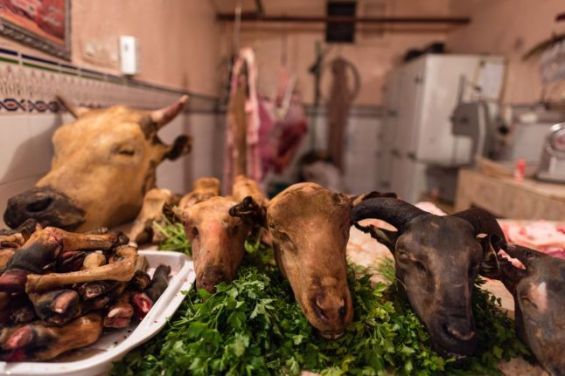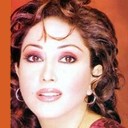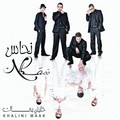It is that time of the year again, when Muslims around the world start preparing for Eid al-Adha. Families in Morocco are also concerned with the ritual, checking off the list of objects and goods they have to purchase for the greasy feast. Once equipped with the right gadgets and sharpened knives, sleeves get rolled up to make delicious mutton-based dishes.
Beside the religious side of it, Eid al-Adha is a very important part of Moroccans’s lifestyle. Buying an animal is a must and eating meat is probably even more important. But what is it about this «obsession» with meat and what is this relationship Moroccans have with meat eating?
As far as researchers and historians know, Moroccans had a very special relationship with animal meat, both red and white meats. Centuries ago, meat eating in Morocco was not necessarily an option, it was more of a practice that wasn’t widespread.
Moroccans and meat, a 16th century story
Indeed, not everyone had the means to feature meat in their tajines and couscouses frequently. Mind you, this was not because it wouldn't have been deemed delicious enough, but because of a social structure that did not allow for it in the first place.
Thus was the case in Morocco during the 16th century, according to Moroccan social historian Mohamed Houbaida. In his book «Le Maroc végétarien, 15ème-18ème siècles : histoire et biologie» (Eddif, 2008), the professor traced back how Moroccans viewed meat and spotlighted their culinary habits during that era.

After puzzling over eating habits in the Kingdom, he concluded that «meat consumption is mainly related to social factors». Quoting Berber Andalusi diplomat Leo Africanus, who traveled along Morocco, Houbaida wrote that at the beginning of the 16th century Moroccans were accustomed to eating «fresh meat twice a week», stressing that only «gentlemen ate it twice a day», referring to nobility from Fez.
But at the time, the city was a center of wealth and meat consumption there was way more different than other parts of the country. Here, the historian recalls that in the rest of the country, only well-off people had the chance to spice their dishes with meat, while «peasants and laymen ate it only occasionally».
Houdaifa explains that consuming meat in 16th century Morocco depended on, not only social factors, but also geographical ones, concluding that the practice remained variable. However, he referred to Eid al-Adha as that part of the year, when everyone would be able to eat meat, even those who would visit the souk (farmer’s market) without being able to purchase it.
A social behavior or psychological complex
Although the 16th century seems very far, our eating habits have evolved since then but without getting rid of some beliefs and norms. And that applies to meat consumption too. To Moroccan psychosociologist Mohcine Benzakour, consuming meat has long been related to weekly farm markets in the Kingdom. «People used to visit every week these markets to trade their goods for meat», he recalled.
Purchasing an animal at the farmer’s markets was not just a leisure, but served social purposes and principles within the Moroccan society, Benzakour pointed out.
«When receiving guests, family members and loved ones, Moroccans used to slaughter an animal as a way of displaying hospitality», the researcher said. Through this practice, meat eating became associated with family gatherings, weddings, festivities and also Eid al-Adha.

But these conventions started taking different forms with time. According to Benzakour, meat-related dishes and activities moved from social behaviors to feelings of peer pressure, especially during Eid al-Adha. «Some people are afraid of being mocked for buying a small or skinny sheep», he argued.
To him, the tradition or the religious ritual evolved into a practice that is mainly driven by social affiliation, or the feeling of being part of a group. «Some people are ready to sell their belongings and ask for loans to purchase an animal ahead of Eid al-Adha, even those who cannot afford it», Benzakour added.
These people would even try to find excuses to justify this «obsession», claiming that they want to please their kids and family members. But in reality, the urge of consuming meat during this holiday is just a desperate way of not being left aside.
But social affiliation is not the only reason that pushes some Moroccans to insist on having meat on the table. The psychosociologist explains that the need of marking a certain social status is also part of the story. «Wanting to eat meat frequently can also be seen from a psychological point of view», he said, adding that growing with the idea that you cannot afford something can leave people with this complex of «exaggerating».

«Some people tend to exaggerate, when they finally can buy something they have been longing for years, and that goes also for meat consumption», Benzakour concluded.
Meat vs. education
But is exaggerated meat consumption just a matter of social class or is there another dimension to it? That question was answered in a study about «Consumption Habits in Morocco and Their Influencing Factors».
The 2015 survey, conducted by Rachida Belloute and Mohammed Diouri from the Moulay Ismail University, suggests that the more educated Moroccans are, the less they would want to eat meat and vice versa.
Data compiled by the two researchers show that «the people who followed scientific studies prefer to eat meats not more that 1 to 2 times a week, whereas people without specialty (illiterate or having a low level of education) prefer to eat meats at least three times a week».

Moreover, the study explains that even those who «have a lower lever than high school diploma prefer to eat meats more than people who have a higher level of studies», adding that the latter category tend to rely on a «balanced» diet with vegetables, legumes, cereals and fish.
And to wrap it up, the two researchers concluded that in Morocco, there is an «excessive consumption of white and red meats» and that these habits have been influenced throughout the years by several factors that included the «level of education and cultural» specificities.
Now that you have a glimpse of the way Moroccans see meat, how would you define your own relationship with it ?





 chargement...
chargement...












